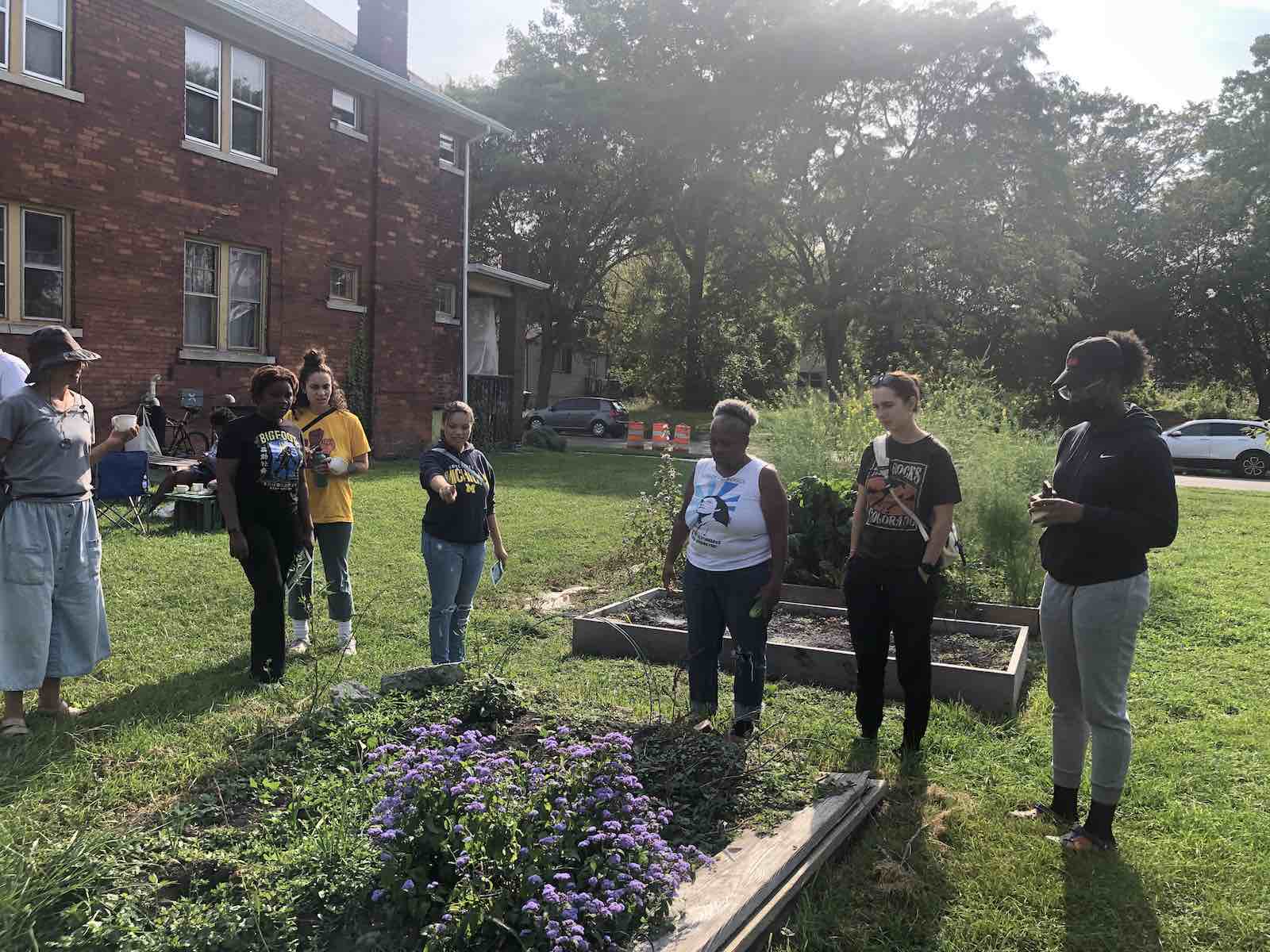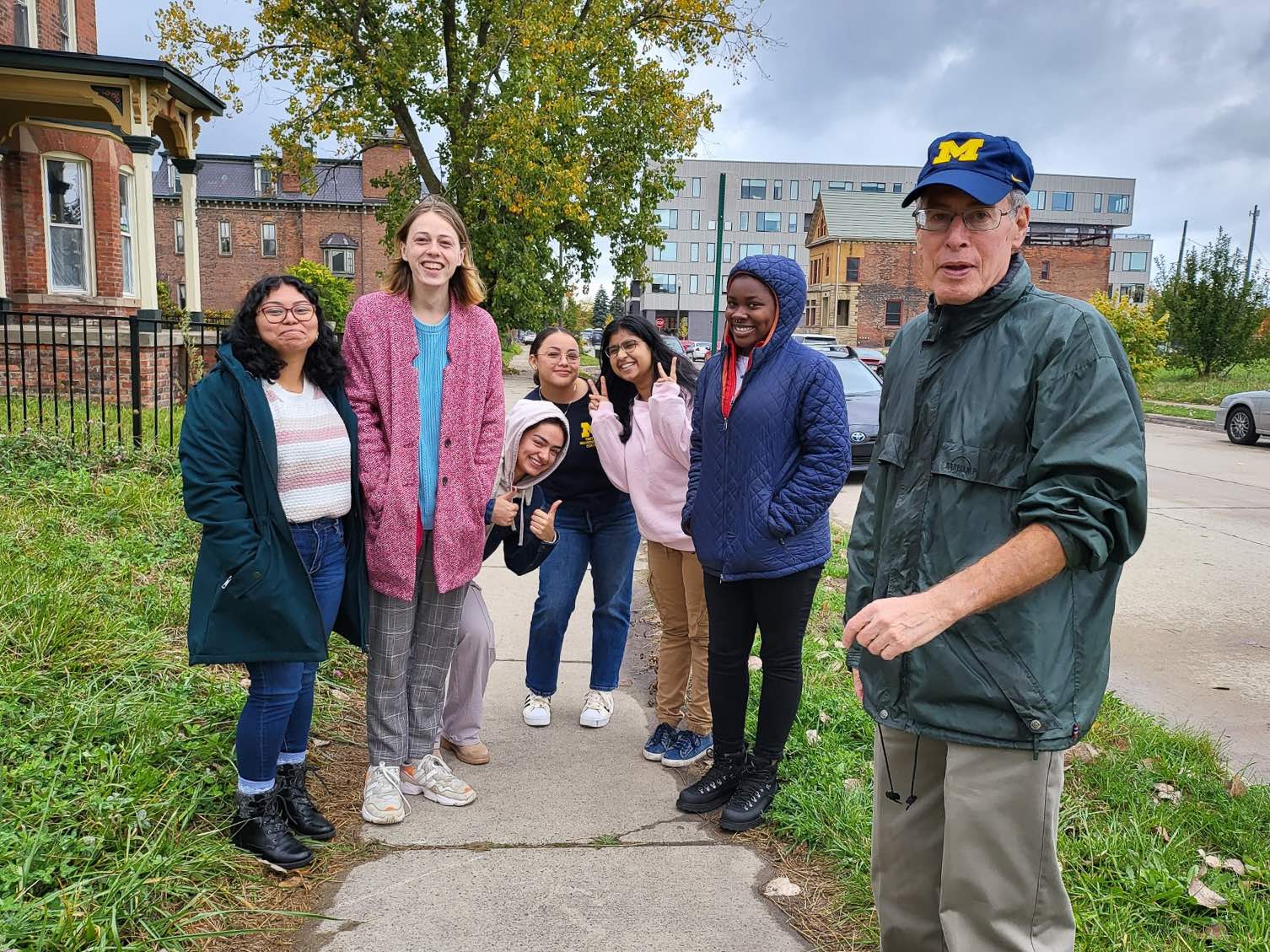
UM-Dearborn students who want to learn about different cultures in a city that’s played an important role on the world stage don’t have to look far. With its rich history and historically Mexican, Greek, Polish, Irish and Southwest Asian neighborhoods, to name a few, Detroit is a great place for an intercultural experience, says Director of Global Engagement Scott Riggs. And Dearborn Wolverines can participate in Semester in Detroit, a four-month program where students can live, work and learn in the city.
“Global engagement does not have to be international. It’s intercultural. It is having an experience where you learn from someone who has a perspective that’s different from yours. U-M’s Semester in Detroit is a way to do this close to home,” Riggs says.
The SiD program, which is run out of UM-Ann Arbor and hosts classes at the UM-Detroit Center, gives UM-Dearborn students the opportunity to take urban and regional studies-themed courses and a Detroit-based internship for credit. Students are encouraged to live downtown at an affordable rate, but it is not required. SiD courses can be counted towards UM-Dearborn graduation requirements, but students should talk with their academic adviser to discuss how it fits with their degree program. Internships — which are with nonprofit organizations — are matched based on student interests.
The benefits of such an experience are extensive, Riggs adds: “Global engagement can help us work through our difficult differences and move toward better understanding one another, which ultimately is what is needed if we ever hope to address the numerous challenging borderless issues facing the world today.”
The program also gives students a chance to learn more about Michigan’s largest city. “The Semester in Detroit program gives a first-hand experience of immersing yourself in Detroit, while getting to know the neighborhoods, the people and the city itself,” Riggs explains.
Recently, three recent UM-Dearborn SiD alums shared a little about their experience.
Leah Williams, finding a future in the city
Leah Williams chose UM-Dearborn because it has a welcoming feel, was close to her Redford home and has smaller class sizes. But as friendly as the campus is, Williams wasn’t sure what exactly she wanted to study or where she’d find her people.
Then, during her first year at UM-Dearborn, she applied to the SiD program after learning about it in an email from the Dean of Students — and everything changed. “At that time, I was nervous to break out of my comfort zone. It can be a little scary to jump into something new. But I know college is about new experiences and growth, so I told myself to try,” she says. “It changed my life and I can’t recommend it enough.”
Williams, who chose to live in a SiD-designated apartment in Detroit’s Midtown during the four-month program, says she learned how to live independently, saw up close some of the challenges and opportunities in Detroit, met new friends from UM-Ann Arbor and UM-Dearborn, and took advantage of downtown experiences like ice skating at Campus Martius.

Williams, who loves theater and acts in local productions, completed an internship at Matrix Theatre Company in Southwest Detroit, where she assisted with community performances and promotion. She says that experience showed her how things she enjoys can have a place, even when it’s not a direct part of a career path. “I love theater, but didn’t see how it would be a part of my professional future. The internship showed me how I can incorporate my passion for things like theater into my career,” she says. “You can use the skills or talents that you have in other areas no matter the field you choose.”
Williams — who liked how the classes included learning excursions around the city — also found an area of study she felt connected to: the urban and regional studies major. She took courses that examined environmental concerns in Detroit, the city’s history, educational inequities, food justice efforts and more. “I feel like I have a deeper connection to the city — a city my parents grew up in. I saw how I can channel my passion of helping others into Detroit neighborhoods,” she says. “My parents told me what a special place Detroit was and is. And now I can honestly say that I get it. I love Detroit and can see my future there.”
Jordan Jones, the advocate who returned to college
Jordan Jones has worked for nonprofits and supported antiracist movement work for years. She says social justice efforts are necessary because they look to solve complex problems, but she has also noticed that they can fall short when they don’t offer feasible solutions.
“Legislators and policymakers think and speak in concrete terms. We can’t say, ‘defund the police’ without a tangible solution as to what will replace the police. If advocacy work doesn’t get down to brass tacks, people who we need to help make the changes might not listen,” Jones says. “Solutions need to be digestible and realistic. I returned to college to learn more about how to best help communities where I’m needed.”
Jones, who is pursuing a degree in health and human services with a concentration in public health, chose UM-Dearborn because she saw that the university works extensively in Detroit communities. Having experienced hardships in her own life — she was raised by a single mother following the murder of her father — Jones wants to help people connect to needed resources. “There were people there for me when I needed it,” she says. “And I am not sure where I would be today without them. Now I want to be that support for someone in need.”
When she learned about the Semester in Detroit program, Jones saw an opportunity to get an applied education. She worked as an intern at the Detroit Justice Center, where she assisted with several projects, including a Family Law Handbook, which will be distributed throughout the Michigan prison system to inform incarcerated citizens about their custodial rights. Through her courses, Jones met with Detroit artists and activists. She also participated in field visits to sites like Feedom Freedom Growers community garden on Detroit’s east side, and the James and Grace Lee Boggs School, an elementary school focused on community empowerment that is named after two legendary social justice activists.
“Sometimes, when we’re trying to create change, we feel like we’re working in isolation and wonder if we’re making an impact. But programs like SiD show us how to do this work in practical ways, in community. It lets us know that there are others out there who are working to change the status quo — even when we don’t see it, to know that it’s happening all around us. That energizes me and gives me momentum to keep moving forward,” Jones says. “When I applied to UM-Dearborn, I knew it would change me in ways I couldn’t know. It has. And I can say the same about my Semester in Detroit experience.”
Ivett Facundo, the lifelong Detroiter
Ivett Facundo grew up in Detroit. But she didn’t learn about her city’s deep roots until she took courses through SiD.
“Growing up in Detroit, I wasn't able to walk around as a kid because of how the media portrayed the city as not safe. This made my parents very protective of us, and like many other kids in the community, we had transportation challenges, immigration scares and other obstacles that prevented me from getting to know the city,” Facundo says. “The Semester in Detroit program opened my eyes to the people and history of my city.”
A first-generation Mexican-American, Facundo lives in Southwest Detroit and is surrounded by families from Mexico and Central and South America, but she didn’t know the history behind her community. Facundo says she learned more about the culture and needs of the neighborhoods as an intern at Garage Cultural, an arts organization that produces a variety of events, public art installations and educational programs.

In addition, Facundo says her courses brought in community historians, took her to sites around the city that examined the city’s Black and Latino/Latina history and exposed her to a variety of cultural histories. She was inspired to complete an independent research project where she focused on the Mexicantown neighborhood. She says she learned how labor migration from Texas and Mexico helped create the culturally rich community she lived in as a child — and she was pleased to see the first historic marker honoring Tejano musical contributions to Michigan go up in 2023. It’s on the northeast corner of Bagley and 21st streets.
“More and more historians are advocating to document how Southwest Detroit came to be, the challenges people faced and the outcomes. Hopefully I’ll be in the mix to help with that,” she says.
Facundo also says she learned more about why her friend’s family was forced to move from the Delray home they owned. “I knew she had to move away when we were in high school and they were upset about it, but I didn’t know why. I learned it was to make room for a bridge that would allow for more trucks to travel across to Canada, which would benefit industry — but not the neighborhood,” she says, while also noting the environmental and health concerns in the neighborhood caused by higher levels of air and sound pollution due to increased semi-truck transportation. “Many people were displaced from their homes, which is not right, but it was still allowed to happen.”
Facundo, who graduated in December, says the program did more than help her feel more connected to her city — it also helped her map her future. Facundo recently accepted a full-time position with Deloitte Global, where she will focus on diversity, inclusion and equity initiatives along with corporate responsibility efforts.
###
The SiD program is currently accepting applications and substantial need-based financial aid is available. Apply here. Article by Sarah Tuxbury



